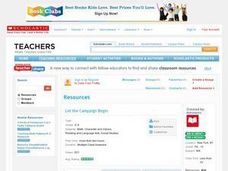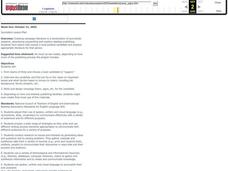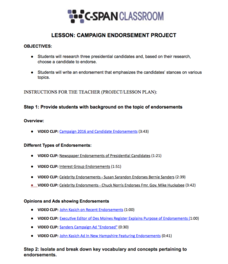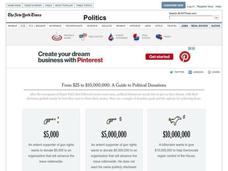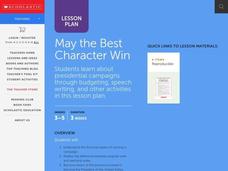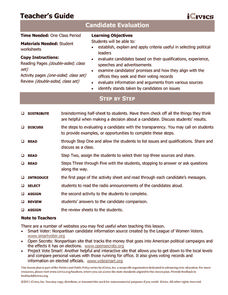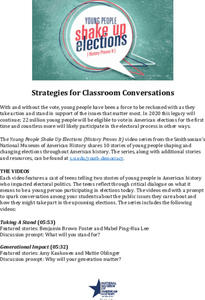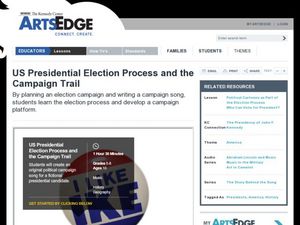Curated OER
The Campaign Process
In this sequencing the campaign process worksheet, students arrange the steps of political campaigning in the correct order and write details explaining how to do each step. Students rearrange and write seven short answers.
Curated OER
Let the Campaign Begin
Students examine the many steps involved in the electoral process. They examine past president's campaigns and write an announcement speech for the candidate of their choice.
Curated OER
The Presidential Campaign Game
Students play a game. In this election lesson, students play the Presidential Campaign Game. Students learn about the politics and process of electing a president.
Encyclopedia Britannica
Get out the Vote Campaign
While some of your young scholars may be too young to vote, they can get involved in the election process by creating a nonpartisan campaign encouraging voter registration. After researching how to register to vote, class members design...
Curated OER
Campaign Signs and Pranksters
Pupils interview a selected candidate and find out his or her views on important issues and what he/she hopes to convey to voters. They write and design campaign flyers. Students create final mock-ups of the materials.
C-SPAN
Campaign Endorsement Project
So many politicians, so many endorsements! Learn to differentiate between facts as well as the process of endorsements with an informative resource. Class members watch current endorsement videos, research candidates from three different...
Curated OER
May The Best Character Win
Students examine the financial committment to running a campaign. They discuss the difference between electroal and popular votes. They realize how involved a political campaign is!
The New York Times
A Guide to Political Donations
Voters determine the outcome of elections, but campaign donors can influence the attitudes of those voters. Explore nine examples of donors and the amounts of money they want to contribute, and the legal ways the groups can or cannot...
Curated OER
May the Best Character Win
Running an election campaign takes money. Class groups must effectively budget money in order to design and purchase sufficient advertising aimed at procuring classmates' votes. After completing an online tutorial, they also write and...
iCivics
Candidate Evaluation
How can we decide between candidates on election day? After contemplating various issues and qualities, your learners will go through a step-by-step process of researching and evaluating sample candidates and determining their...
iCivics
Win the White House
Here is a unique and engaging approach to learning about the steps a presidential candidate must take during a campaign. Learners role play the part of a candidate in this online interactive, taking part in a presidential debate and then...
Teaching Tolerance
Community Mural / Poster Campaign
Every piece matters. A creative lesson provides an opportunity for scholars to create murals or posters that represent their views on social justice. Academics work on smaller posters or pieces of a mural that will ultimately be...
Museum of the Moving Image
Developing Critical Analysis
To gain an understanding of how images and sounds are used to influence viewers, class members analyze these features in Presidential campaign commercials from 1952-2012.
PBS
What Are the Primaries and Caucuses?
What are the essential differences between primaries and caucuses? As part of a study of the process by which Americans select their candidates for US president, class members examine the nominating process, the changes that have...
Smithsonian Institution
Young People Shake Up Elections (History Proves It) Educator Guide
Vote, it's your civic duty! The resource provides several videos about voting in the United States. Scholars watch a series of topics ranging from youth participation to civic action. The educator's guide provides teachers with...
Curated OER
US Presidential Election Process and the Campaign Trail
Young scholars campaign for president. In this presidential election lesson, students discuss the process of electing presidents, write their own campaign songs, research a campaign train schedule, and create campaign maps.
Curated OER
A Race to Watch: Campaign 2008, The Role of Technology and the Internet
Young scholars listen to a statement about the role the Internet plays in the political process and respond by placing a card under the appropriate agree/disagree sign at the front of the room. Students brainstorm reasons to select their...
Encyclopedia Britannica
Becoming US President
It's that time of year, and the year. Once again the race is on for the White House. It's important that young voters, and would-be voters, understand the process for becoming the United States President. Class members research the...
Curated OER
Voting Process
Young scholars study and participate in the voting process. In this voting process activity, students read Duck for President and vote on class snacks. Young scholars create posters for the class snacks and present them to the class....
Curated OER
What is a Democracy?
Learners identify what makes a country democratic and compare United States and Indian political party symbols. They create their own political party and party symbol. They create a campaign speech, participate in the voting process...
Museum of the Moving Image
AdMaker, Nixon vs. Humphrey, “Convention” (1968)
After viewing the infamous 1968 Presidential campaign ad, "Convention," groups use AdMaker to create their own 30 second ad that features Richard Nixon rather than Hubert Humphrey.
C-SPAN
Student Symposium and Resulting Action
Your class may not be able to vote yet, but that doesn't mean they can't feel like they're part of the presidential election! The resource creates a symposium where pupils debate about a selected topic in current events during an...
Museum of the Moving Image
Political Ads in Historical Context
Campaign ads target both timely issues and general themes. Presidential campaign ads from 1952 and 1988 provide class members an opportunity to compare how the topics ads choose to address can dramatically influence election outcomes.
Caucus 101
Linkage Institutions: Interest Groups: Option A
How are elections really run and won? Learn about special interest groups, super PACs, and lobbyists with an engaging lesson about the caucus process. Young voters research specific interest groups and analyze their part in previous and...



